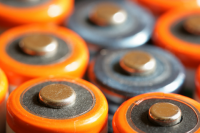Russia – The Russian metropolis of St Petersburg might be Europe’s third-largest city after Moscow and London, but it still lacks a battery law or directive. However, a special project has increased the city’s battery collection figure from virtually zero in 2002 to some 7 tonnes so far this year.
‘It has been a long road,’ Dmitry Krutoy of the Government of St Petersburg told ‘Recycling International’ at the recent International Congress for Battery Recycling in Dubrovnik, Croatia. He well remembers presenting the first results to a board of local stakeholders and officials who weren’t too impressed with the ‘measly’ 100 mercury lamps and the odd battery collected when the scheme was first launched.
However, Greenpeace as well as German and Finnish project partners – respectively, Stadtreiningung Hamburg and the Environmental Protection Office of Turku – took a different view and combined to help extend collections to 400 lamps and 100 batteries in 2008, growing to 17 000 batteries just a year later and then to 43 000 in 2011.
The project has since scaled new heights, raking in 2.3 tonnes of batteries last year and the aforementioned 7 tonnes so far in 2013. Krutoy stated in Dubrovnik: ‘Starting out, the numbers were not what we had in mind. Soon we saw they were going up, proving there was so much potential.’
From thousands to millions
Progress was achieved by extending the number of eco-posts (a fleet of mobile trucks), eco-boxes (in shops) and eco-terminals (large battery/mercury bins) to more districts across St Petersburg, he explained. While the Moskovskiy district pilot involved only 25 000 people, the battery initiative now covers the entire city, catering to the needs of nearly 5 million inhabitants and including more than 150 collection points at metro stations and other hotspots.
The ‘battery van’ has turned out to be a particular hit, registering 1000 visitors per month. Spreading the collection message to a larger network of retailers is ‘the next step’, according to Krutoy.
Talking about the unrelenting popularity of battery-driven products and individual batteries of various kinds, he underlined that consumers aren’t the root of the recycling problem. ‘Roughly 90% of all batteries on the Russian market are imported,’ he argued.
‘Since most manufacturers are foreign and marking batteries is not yet a common practice – to my surprise – it remains largely unclear what is inside the batteries. Basically, consumers may be handling hazardous waste.’ Therefore, the aim is now to collect not just batteries but different types of hazardous waste.
Given the results and support thus far, Krutoy said he feels ‘confident’ when looking ahead.
For more information, visit: www.eng.gov.spb.ru
Don't hesitate to contact us to share your input and ideas. Subscribe to the magazine or (free) newsletter.



